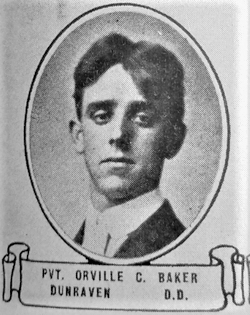
Orville Baker led an ordinary life.
One of six kids in an ordinary family who grew up in an ordinary town, his death was ordinary, too, for the times. Orville succumbed in 1918 to pneumonia in the murderous worldwide influenza pandemic while serving with thousands of US soldiers in France.
The inscription on his headstone in the Taylor Farm Cemetery in New Kingston might have been all we remembered about Orville Charles Baker – that he was born August 3, 1894, died Oct. 2, 1918 and served in Co. E of the 104th Ammunition Train – were it not for an email received by the Historical Society of Middletown from a teacher in France.
Anthony Le Brazidec wrote to say he is compiling information on 300 American soldiers who were buried in a temporary cemetery in his town, Morbihan, in Brittany on the northwest coast of France. He had already found the online 1918 Catskill Mountain News article reporting Orville’s death, but he wanted to know the exact date of his burial in New Kingston in 1920.
Anthony shared documents showing when and where Orville was buried in Morbihan, and the details of the repatriation of his remains to his parents, George and Hattie Baker, two years after his death. This came as news to us: We knew about the memorial service for Orville held at the New Kingston Presbyterian Church on Sunday, Nov. 10, 1918, one day before the Armistice was signed ending WWI. And we knew the pastor who had officiated at the service, Rev. Jesse Jamieson, had, like pastors everywhere in Middletown and across the country, rung the church bells with joy that momentous Monday, before the good reverend himself died of a stroke two days later.
But because the Catskill Mountain News is missing for 1920, we did not know that the body of Orville C. Baker was not present for that service, or for the observance of the end of the war that claimed him.
A letter sent to the Baker family by Capt. James B. Puller, commander of Baker’s company, explained that Orville (he was inducted at Delhi May 13 and arrived in France June 29, 1918) had become ill in September and died after a month in the hospital. “He was visited frequently by both the officers and men of his company as all seemed to think a great deal of him,” wrote Capt. Puller in the letter reprinted in the News January 31, 1919. “He was buried in his military uniform with military honors and his company marched to his funeral.”
Records provided by Anthony LeBrazidec more than a century later show that long after his burial and the cessation of hostilities, Orville’s body was one of thousands collected from cemeteries across France to be returned to the US. It was removed from Morbihan July 20, 1920 and was shipped to Brest, France where it was held for a month and prepared for the two-week Atlantic crossing aboard the Princess Matoika, a luxury liner-turned-troop transport that carried 1,284 repatriated remains on this its last voyage for the US Army.
Orville Baker’s casket was then put on a train in Hoboken and taken to Arkville, where his 72-year-old mother claimed her son’s remains October 9, no doubt breaking her heart all over again.
Despite historian Shirley Davis’ search through church records, we were unable to find the exact date of his reinterment at the hillside cemetery not far from the Baker home, as Monsieur LeBrazidec asked. But we are happy to know that this French researcher plans to erect a plaque to the American soldiers who once rested in Morbihan, and we are grateful for this additional information on one Middletown soldier and his long road home.
